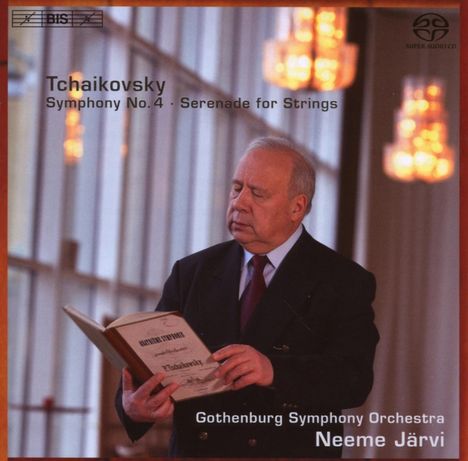Peter Iljitsch Tschaikowsky: Symphonie Nr.4 auf Super Audio CD
Symphonie Nr.4
Die SACD verwendet eine höhere digitale Auflösung als die Audio-CD und bietet außerdem die Möglichkeit, Mehrkanalton (Raumklang) zu speichern. Um die Musik in High-End-Qualität genießen zu können, wird ein spezieller SACD-Player benötigt. Dank Hybrid-Funktion sind die meisten in unserem Shop mit "SACD" gekennzeichneten Produkte auch auf herkömmlichen CD-Playern abspielbar. Dann allerdings unterscheidet sich der Sound nicht von einer normalen CD. Bei Abweichungen weisen wir gesondert darauf hin (Non-Hybrid).
(soweit verfügbar beim Lieferanten)
+Serenade für Streicher op. 48; Elegie in Memoriam I. V. Samarin
- Tonformat:
- stereo & multichannel (Hybrid)
- Künstler:
- Gothenburg Symphony Orchestra, Neeme Järvi
- Label:
- BIS
- Aufnahmejahr ca.:
- 2004/2005
- Artikelnummer:
- 1021600
- UPC/EAN:
- 7318599914589
- Erscheinungstermin:
- 27.5.2008
In the cycle of Tchaikovsky’s symphonies with Gothenburg Symphony Orchestra conducted by Neeme Järvi, we have reached the fifth instalment. As described by reviewers, previous releases include ‘a superb Symphony No. 1, cleansed from any residues of syrupy romanticism’ (Classics Today France. com), ‘an outstanding performance of the Little Russian Symphony [Symphony No. 2], beautifully played and paced and immaculately recorded’ (Gramophone), an interpretation of the Fifth striking in its ‘dramatic and architectural cohesion’ (Le Monde de la Musique), and a Sixth which ‘packs a powerful punch’ with ‘a dazzling performance of the march and some gut-wrenching climaxes in the final adagio’ (The Guardian, UK).
The time has now come to Symphony No. 4, which – along with No. 5 – Tchaikovsky himself often referred to in the context of ‘Fate’, symbolized by a ‘fate motif’ which opens the work and which the composer described as follows: ‘This is fate, destiny, that portentous power that will not permit our quest for happiness to be successful, that jealously stands guard so that our joyfulness and peace are neither perfect nor cloudless, that hangs like the sword of Damocles above our heads and constantly, continually poisons our soul.’ In his description of the end of the work, Tchaikovsky sounds a note of resignation: ‘Look within yourself; do not say that everything in this world is sad. There are simple but strong joys. Rejoice in others’ rejoicing. To live is still possible.’ This last statement seems to be borne out in full by his Serenade for Strings in C major, composed three years later, a carefree expression of happiness that is never seriously disturbed by minor-key sonorities. The programme finishes off with an Elegy, also for strings.
Disk 1 von 1 (SACD)
Sinfonie Nr. 4 f-moll op. 36
-
1 1. Andante sostenuto - Moderato con anima
-
2 2. Andantino in modo di canzona
-
3 3. Scherzo: Pizzicato ostinato - Allegro
-
4 4. Finale: Allegro con fuoco
Serenade für Streichorchester C-Dur op. 48
-
5 1. Pezzo in forma di sonatina: Andante non troppo - Allegro moderato
-
6 2. Walzer: Moderato
-
7 3. Élégie: Larghetto elegiaco
-
8 4. Finale: Andante - Allegro con spirito
Élégie in Erinnerung an I.V. Samarin für Streichorchester
-
9 Andante non troppo
Mehr von Peter Iljitsch ...






